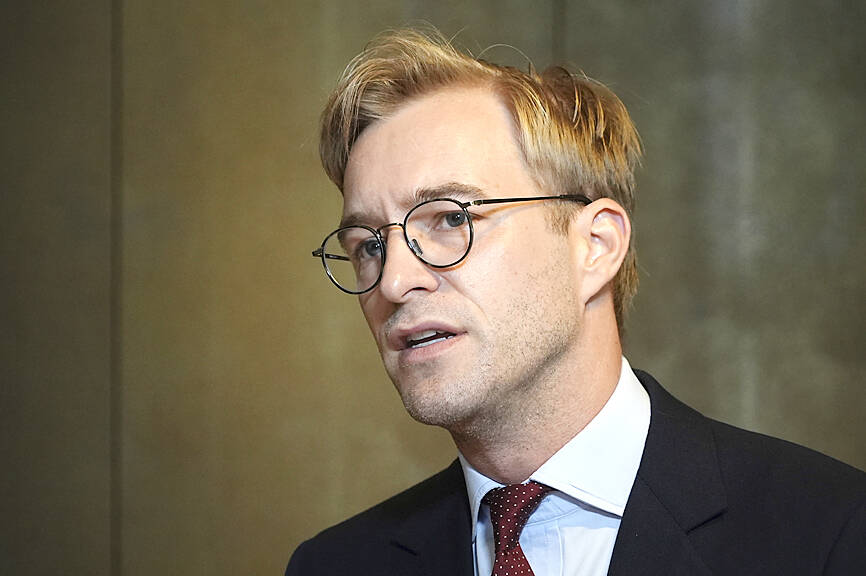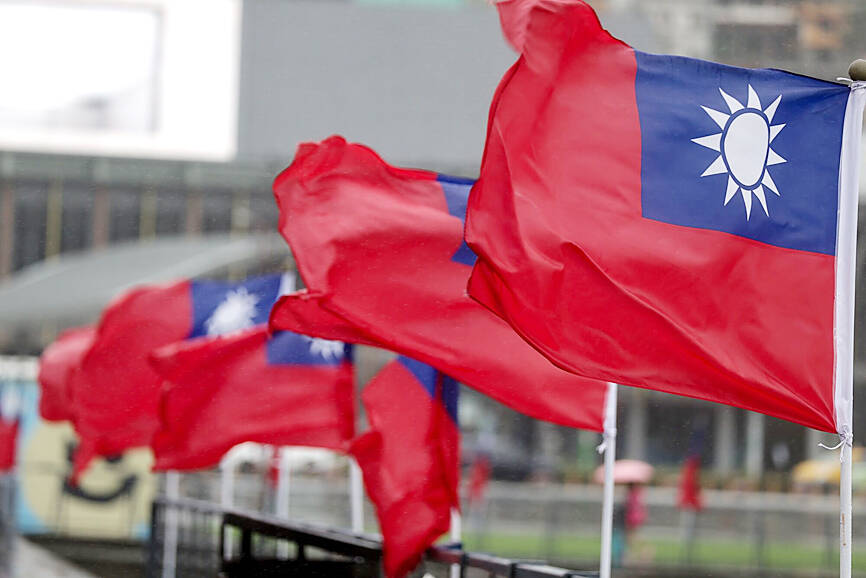Chinese diplomats are pressuring lawmakers from at least six countries not to attend a China-focused summit in Taiwan, participants said.
Politicians in Bolivia, Colombia, Slovakia, North Macedonia, and Bosnia and Herzegovina, and one other Asian country that declined to be named, say they are receiving texts, calls and urgent requests for meetings that would conflict with their plans to travel to Taipei, in what they describe as efforts to isolate Taiwan.
The Inter-Parliamentary Alliance on China (IPAC) summit officially begins tomorrow. The alliance is a group of hundreds of lawmakers from 35 countries concerned about how democracies approach Beijing.

Photo: Chiang Ying-ying, AP
The Associated Press spoke to the organizers and three lawmakers, and reviewed texts and e-mails sent by Chinese diplomats to the lawmakers asking whether they were planning to participate in the summit.
“I’m Wu, from Chinese Embassy,” read a message sent to Macedonian lawmaker Antonio Milososki. “We heard that you got an invitation from IPAC, will you attend the conference which will be held next week in Taiwan?”
In some cases, lawmakers described vague inquiries about their plans to travel to Taiwan. In other cases, the contact was more menacing.

Photo: I-Hwa Cheng, Bloomberg
One lawmaker said that Chinese diplomats messaged the head of her party with a demand to stop her from going.
“They contacted president of my political party, they ask him to stop me to travel to Taiwan,’’said Sanela Klarić, a member of parliament in Bosnia. ‘’They’re trying, in my country, to stop me from traveling…This is really not OK.’”
China routinely threatens retaliation against politicians and countries that show support for Taiwan, which has only informal relations with most nations due to Chinese diplomatic pressure.
Klaric said the pressure was unpleasant, but only steeled her determination to go on the trip.
“I really am fighting against countries or societies where the tool to manipulate and control peoples is fear,” she said, adding that it reminded her of threats and intimidation she faced during the Balkan wars in the 1990s. “I really hate the feeling when somebody is frightening you.”
The Chinese Ministry of Foreign Affairs did not immediately respond to a request for comment.
In a statement yesterday, IPAC said it “deplores and condemns the PRC’s [People’s Republic of China’s] attempt to interfere in its annual summit.”
“Democratically elected lawmakers are free to visit and support causes of their choosing. This is the normal exercise of their rights and responsibilities as elected officials,” it said.
“The PRC’s actions around IPAC’s Summit are yet another example of their brazen efforts to curtail other nations’ democratic privileges and negate Taiwan’s rights to engage in legitimate diplomatic exchanges,” it added.
The alliance, which aims to coordinate diplomacy in response to perceived threats from Beijing, has long faced pressure from the Chinese government.
Some members have been sanctioned by Beijing, and in 2021 the group was targeted by Chinese state-sponsored hackers, a US indictment unsealed earlier this year showed.
However, alliance executive director Luke de Pulford said the pressure from Chinese officials the past few days had been unprecedented.
During past meetings in other locations, lawmakers were approached by Chinese diplomats only after they concluded. This year, the pressure has sharply escalated and appears to be a coordinated attempt to stop participants from attending.
“This is gross foreign interference. This is not normal diplomacy,” De Pulford said. “How would PRC officials feel if we tried to tell them about their travel plans, where they could and could not go? It’s absolutely outrageous that they think that they can interfere in the travel plans of foreign legislators,” he said.
Lawmakers from 25 countries are expected to attend this year’s summit, which is to feature high-level meetings with Taiwanese officials, a news release said.
China has been peeling off Taiwan’s diplomatic allies, often with promises of development aid, in a long-running competition between the nations that has swung in Beijing’s favor in the past few years.
The Pacific Island nation of Nauru switched recognition to Beijing earlier this year, a move that reduced Taiwan’s number of diplomatic allies to 12.
However, China’s at times heavy-handed approach has also triggered backlash.
In 2021, Beijing downgraded relations and blocked imports from Lithuania, an EU and NATO member, after the Baltic nation broke with diplomatic custom by agreeing that a Taiwanese representative office in its capital of Vilnius would bear the name Taiwan instead of Taipei, which some other countries use to avoid offending Beijing.
The following year, the EU adopted a resolution criticizing Beijing’s behavior toward Taiwan and took action against China at the WTO over the import restrictions.
Most of the lawmakers targeted appear to be from smaller countries, which De Pulford said was likely because Beijing “feels that they can get away with it.”
However, he added that the coercive tactics has only made participants more determined to participate.
Miriam Lexmann, a Slovakian member of the European Parliament whose party head was approached by Chinese diplomats, said the pressure underscored her reason for coming to Taiwan.
We want to “exchange information, ways how to deal with those challenges and threats which China represents to the democratic part of the world, and of course, to support Taiwan,” she said.

The Central Election Commission has amended election and recall regulations to require elected office candidates to provide proof that they have no Chinese citizenship, a Cabinet report said. The commission on Oct. 29 last year revised the Measures for the Permission of Family-based Residence, Long-term Residence and Settlement of People from the Mainland Area in the Taiwan Area (大陸地區人民在台灣地區依親居留長期居留或定居許可辦法), the Executive Yuan said in a report it submitted to the legislature for review. The revision requires Chinese citizens applying for permanent residency to submit notarial documents showing that they have lost their Chinese household record and have renounced — or have never

A magnitude 5.6 earthquake struck off the coast of Yilan County at 12:37pm today, with clear shaking felt across much of northern Taiwan. There were no immediate reports of damage. The epicenter of the quake was 16.9km east-southeast of Yilan County Hall offshore at a depth of 66.8km, Central Weather Administration (CWA) data showed. The maximum intensity registered at a 4 in Yilan County’s Nanao Township (南澳) on Taiwan’s seven-tier scale. Other parts of Yilan, as well as certain areas of Hualien County, Taipei, New Taipei City, Taoyuan, Hsinchu County, Taichung and Miaoli County, recorded intensities of 3. Residents of Yilan County and Taipei received

Taiwan has secured another breakthrough in fruit exports, with jujubes, dragon fruit and lychees approved for shipment to the EU, the Ministry of Agriculture said yesterday. The Animal and Plant Health Inspection Agency on Thursday received formal notification of the approval from the EU, the ministry said, adding that the decision was expected to expand Taiwanese fruit producers’ access to high-end European markets. Taiwan exported 126 tonnes of lychees last year, valued at US$1.48 million, with Japan accounting for 102 tonnes. Other export destinations included New Zealand, Hong Kong, the US and Australia, ministry data showed. Jujube exports totaled 103 tonnes, valued at

BIG SPENDERS: Foreign investors bought the most Taiwan equities since 2005, signaling confidence that an AI boom would continue to benefit chipmakers Taiwan Semiconductor Manufacturing Co’s (TSMC, 台積電) market capitalization swelled to US$2 trillion for the first time following a 4.25 percent rally in its American depositary receipts (ADR) overnight, putting the world’s biggest contract chipmaker sixth on the list of the world’s biggest companies by market capitalization, just behind Amazon.com Inc. The site CompaniesMarketcap.com ranked TSMC ahead of Saudi Aramco and Meta Platforms Inc. The Taiwanese company’s ADRs on Tuesday surged to US$385.75 on the New York Stock Exchange, as strong demand for artificial intelligence (AI) applications led to chip supply constraints and boost revenue growth to record-breaking levels. Each TSMC ADR represents